Educational Resources for Students and Teachers
One of the ways in which AFSA hopes to increase students’ interest in the Foreign Service and diplomacy is by encouraging enhanced educational engagement. AFSA has fostered several educational partnerships to offer students unique learning experiences and has also compiled resources on teaching diplomacy.
Below is a list of other organizations that offer exceptional resources for students and educators alike!
Featured Organizations
- National Museum of American Diplomacy
- Association for Diplomatic Studies & Training
- American Academy of Diplomacy
- United States Institute of Peace
- U.S. Global Leadership Coalition
- World Affairs Councils of America
- Council on Foreign Relations
National Museum of American Diplomacy

NMAD is located at the U.S. Department of State in Washington DC and is the only museum in the country dedicated to the subject of diplomacy. In addition to the museum’s exhibits, NMAD offers a wide variety of educational resources for educators and students.
Below is a list of resources designed specifically for educators:
- NMAD offers a Teacher Workshop in the summers which allows participants to interact with State Department subject matter and engage with experts and diplomats to discuss the skills and tools they use in their work at home and abroad to address pressing global issues. Educators also participate in a Diplomacy Simulation and training events designed to facilitate simulations with students. Furthermore, educators explore NMAD exhibits, resources, and collections to enhance classroom instruction and create plans to incorporate American diplomatic history and practice into their curriculum and guide their students to use the skills of diplomacy in their own lives.
- NMAD also offers discussion questions, activities, and other resources for educators on their website called Discuss Diplomacy. It includes topics such as introductory questions on diplomacy, questions on economics, democracy, science, history on foreign relations etc. They also provide dozens of examples for potential activities to conduct in the classroom, as well as additional resources like timelines, collections of oral histories, etc.
Below is a list of general resources for students and educators:
- NMAD offers a series of Diplomacy simulations based on true events to help students learn about the role that U.S. diplomats and the State Department play in international conflicts. Students are meant to step into the role of diplomats and work in teams to build rapport with others, present clear arguments, negotiate, find common ground, and compromise to find a potential solution to a real-life historical crisis.
- NMAD has compiled a Diplomatic Dictionary of relevant terms associated with diplomacy.
- NMAD also has a series of U.S. Diplomacy Stories, which are essentially short articles about important people and events in American diplomatic history.
- NMAD offers a series of Online exhibits that could be useful to students. Exhibits include “The Dayton Accords: Diplomacy Ends a War” and “Her Diplomacy”
- NMAD hosts live virtual events (which are then posted to their YouTube channel) as part of the Diplomacy Classroom program. We feature these events in our daily digest sometimes. These events teach viewers about important events in diplomatic history. The most recent event was “Holocaust Survivors’ Legacies and Preserving the Past.”
The Association for Diplomatic Studies & Training
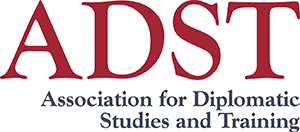
ADST has the largest collection of U.S. diplomatic oral history and offers a wide variety of resources and programs to students.
Below is a list of the opportunities ADST offers students:
- Internship Opportunities: During the summer and academic year, ADST offers internship opportunities in which students work with FSOs, oral history practitioners and Department of State personnel.
- Resources for students: ADST offers useful resources for students and others interested in diplomacy including primary resources such as the ADST-DACOR Book Series of books and memoirs, their Oral Histories collection, and their Country and Subject Readers, which explores countries, international organizations, and relevant topics.
- ADST also has a series of four podcasts on diplomacy: In Their Own Voices, Modern American Diplomacy, Partners in Diplomacy and Cold War Series.
- ADST’s YouTube Channel includes several useful educational videos
Below is a list of the opportunities ADST offers educators:
- ADST has several useful resources aimed at helping educators teach students about diplomacy including sample lesson plans, suggested student projects, and a history source evaluation worksheet.
- ADST also offers other educational resources related to diplomacy including History of Diplomacy exhibit materials
- ADST can also help educators find guest speakers for their classrooms, including former diplomats who can talk about the Department of State, conducting oral histories, the Foreign Service, and their experiences within the Federal Government.
- These resources can all be found here.
The American Academy of Diplomacy
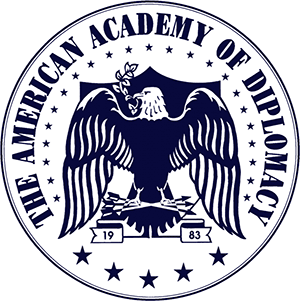
AAD is an organization dedicated to strengthening U.S. diplomacy and enhancing the public ‘s appreciation of its critical role in advancing U.S. national interests.
Below is a list of the various resources and programs offered by AAD:
- AAD offers internship opportunities for students as well as the Graduate Fellowship / Public Affairs and Information Management. The latter offers a fellowship opportunity to a graduate student or a recent graduate to serve as a fellow responsible for expanding communications, member relations, and outreach capacity of the Academy.
- FSOT Career Track virtual Series: The Academy and the State Department’s Diplomats in Residence (DIRs) present a collaborative five-part pre-recorded virtual discussion series that examines the five Foreign Service Officer (FSO) career tracks.
- In collaboration with the Hotchkiss School, the Academy launched the Ambassador Speaker Series, which aims to educate students about the importance of diplomacy. This is part of AAD’s work to engage high schools and universities around the country to educate students about the diplomacy and the work of U.S. Ambassadors overseas.
- AAD also hosts a series of “Ambassadors Forums” in collaboration with University of Nebraska at Omaha and Lincoln, Texas Tech, and University of Michigan.
- AAD publishes two Podcasts: The General & the Ambassador: A Conversation and American Diplomat: Real Stories Behind the News.
- AAD publishes several publications that serve as useful resources for students, educators, and the public to learn more about diplomacy, including its influential 2011 report, Forging a 21st-Century Diplomatic Service for the United States through Professional Education and Training.
Below is a list of resources offered designed for educators:
- In collaboration with the International Center for Jefferson Studies, AAD organized a conference on diplomacy and education: Diplomacy & Education: Discovering and Teaching Reality. This conference offers resources including a workshop summary and important Suggested Readings on Diplomatic Practice.
- For more information on these resources, click here.
The United States Institute of Peace
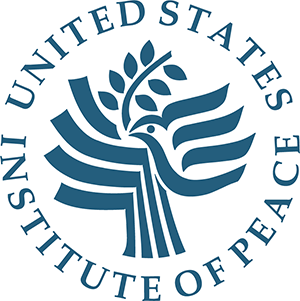
USIP is a national, nonpartisan, independent institute founded by Congress dedicated to the idea that a world without violent conflict is possible, practical, and essential for U.S. and global security. USIP offers a variety of educational resources and opportunities.
Below is a list of resources designed for students:
- USIP’s Peace Club Starter Kit provides a simple framework for students to start their own group or club in their schools or communities.
Below is a list of resources designed for educators:
- USIP gives schools the opportunity to request that a USIP expert speak to their students (either in-person in DC or virtually).
- USIP offers a variety of teaching resources including lessons, activities, study guides, and videos to help educators teach students about peace and conflict. Among these, USIP offers its Peacebuilding Toolkit for Educators, which is a curriculum guide developed by teachers.
- USIP also offers schools the opportunity to participate in USIP’s annual and global Peace Day Challenge designed to inspire actions for peace and highlight the enduring relevance of International Day of Peace (September 21).
- USIP offers a Poster Teaching Guide to support educators and their students in taking action on the International Day of Peace. This includes a complete teaching guide, two lesson plans, and a Family activity Sheet.
- USIP offers a Peace Trail on the National Mall, which brings a “peace lens” to the experience of visiting the Mall. It shares stories of key figures, institutions, and moments in history that demonstrate America’s commitment to peace. In addition to being an ideal field trip idea and resource, classrooms may also visit the trail virtually using the app and accompanying activity kit.
- USIP offers a year-long Peace Teachers Program for middle and high school teachers to receive education, resources, and support to strengthen their teaching of international conflict and peace.
- USIP also offers a variety of webinars that introduce key issues in international conflict management and peacebuilding.
- USIP offers teacher workshops to introduce educators to USIP’s resources for schools. To request a workshop, educators can submit the Group Visit Request Form.
Below is a list of additional resources:
- USIP offers a series of Resources for Higher Education Audiences.
- The USIP Academy: This Academy is designed to provide a wide range of education and training resources and opportunities to those interested in learning about how to resolve global conflict. The courses are designed for busy working professionals who are working in a variety of fields, making this an excellent resource for educators.
- USIP offers a Glossary of Terms for Conflict Management and Peacebuilding
- USIP also publishes a variety of Special Reports and publications that are useful in gaining insight into the world of conflict management and peacebuilding.
U.S. Global Leadership Coalition
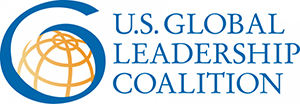
The USGLC is an organization committed to strengthening America’s tools of development and diplomacy by supporting an effective International Affairs Budget and elevating diplomacy on the national stage.
Below is a list of USGLC’s useful resources:
- The Center for U.S. Global Leadership is the USGLC’s education arm, which develops dynamic programs in the nation’s capital and across the country to educate the American public and engage foreign policy and national security leaders about the importance of America’s smart power tools of development and diplomacy.
- The USGLC offers a variety of written resources that inform readers on key developments in foreign policy and international affairs. Some resources include The Global Plum Book, which identifies key political appointees responsible for development and diplomacy policy. They also provide several one-pagers and factsheets addressing a range of issues such as foreign assistance reform, international global health, the Covid-19 pandemic, and climate change.
- The USGLC also hosts events across the country that feature important speakers on foreign policy, global affairs, and diplomacy.
World Affairs Councils of America
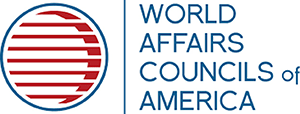
WACA is an organization dedicated to engaging the public to better understand America’s international role and its policy choices.
Below is a list of WACA’s useful educational resources:
- WACA National Conference: WACA holds an annual national conference in DC designed to engage audience members with expert opinions and timely insights about the U.S.’s role in the world.
- Embassy Row Live highlights distinguished diplomats and engages them in new ideas, policy developments, and critical international challenges.
- WACA hosts an annual competition for students to learn about international affairs called Academic WorldQuest.
- WACA offers an Official Study Guide to help students and teachers prepare for the topics covered in the timed question-and-answer AWQ competitions hosted by local Councils.
Council on Foreign Relations: Model Diplomacy

CFR’s Model Diplomacy is a free simulation program that invites students, educators, and professionals from a variety of backgrounds to step into the roles of decision-makers on the U.S. National Security Council (NSC) or UN Security Council.
The program is outlined below:
- Model Diplomacy delivers compelling interactive materials to meet a range of curricular goals and offers a robust library of eighteen case studies, simulating both the U.S. National Security Council and the UN Security Council, covering pressing historical and hypothetical diplomatic issues. Each case has accompanying teaching notes and is created in consultation with Council on Foreign Relations (CFR) experts.
- The program offers pop-up cases—short, one-page scenarios based on issues reverberating in the news today, designed to require less preparation and time.
- As part of this initiative, CFR also offers Model Diplomacy internships for students.
